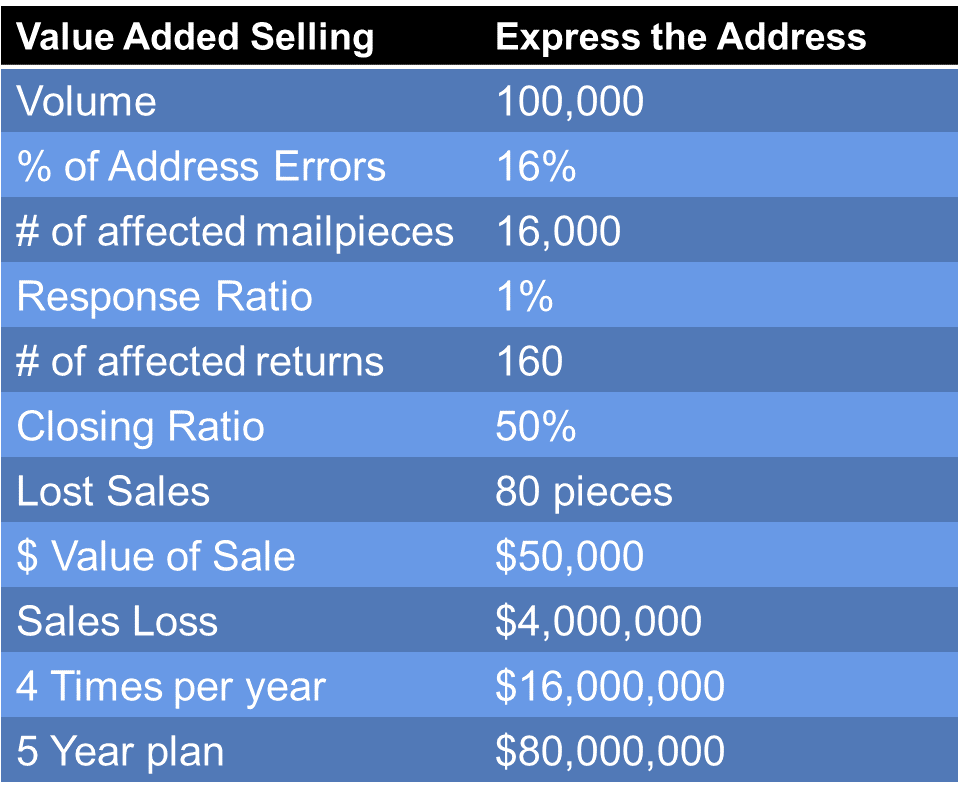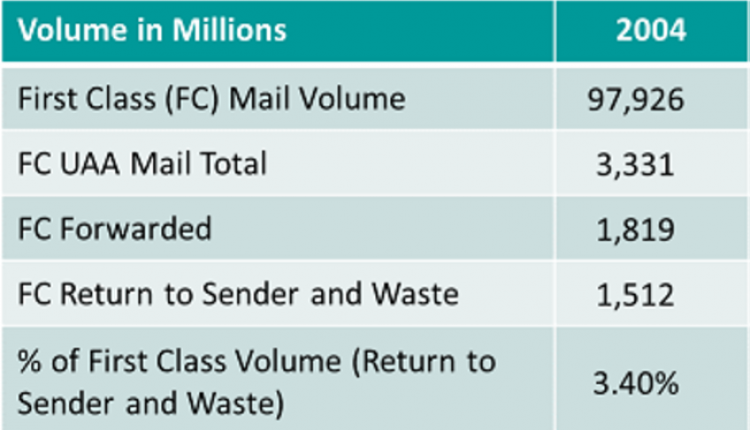This article appeared in the November/December, 2018 issue of Mailing Systems Technology.
The Data Warehousing Institute reports that most organizations believe that their contact data quality is fine. However, the US Postal Service consistently releases news that contradicts this assumption:
• 23.6% of all mail is addressed incorrectly
• The quality of stored US addresses decays at a rate of 17% per year
• Undeliverable-as-Addressed (UAA) mail costs the USPS nearly $2 billion each year
Corporate data governance (or lack thereof) related to mailing address is suspect, challenging, confusing, and damaging to organizations trying to communicate with their clients and prospects.
It is not difficult to get the correct mailing address data through commercial address cleansing software that performs Coding Accuracy Support System (CASS) and National Change of Address (NCOA) functions. What is difficult is getting this correct, complete, and updated information into a company’s database or system of record (SOR).
There is a lot of misinformation in our industry surrounding the “legality” of updating an address record in a company’s database. In my experience, these misconceptions are prevalent across most industry verticals: banking, insurance, tech/energy, and healthcare. Compliance and risk assessment are extremely important in every business. Equally important is educating compliance and risk departments about address quality. Recognizing the difference between actual laws restricting an update to a client’s address and corporate policies that restrict this because of an organization’s desire to protect against any type of risk or liability for having made such changes is crucial. The fact is, there are very few laws governing or preventing a company from updating their SOR. There are many policies that companies and organizations have in place that restrict them from maintaining quality data records for their clients and prospects. Laws are definitive, but policies are not, and they could (and should!) be reviewed and changed to establish a quality data governance process that can protect an organization.
The Importance of Measuring Address Quality
The USPS finally has the tools to measure address quality, and, luckily, they are doing so. Their tools are accurate and sophisticated enough to support the monthly fines and assessments they began sending to mailers in April of 2018. Educating organizations about Move Update Compliance and, specifically, their compliance and risk departments about these requirements is essential. The impact of poor address quality, UAA mail, and a lack of corporate data governance processes has been measured in the tens of billions of dollars annually to corporations across the country.
You may be asking, “Tens of billions of dollars? How is this possible? It’s just an undelivered mail piece….”
Research has revealed that the average cost for an undeliverable mail piece is $3.00/piece for any organization. This figure accounts for the per piece cost to print, post, handle the return, research to find an updated address, and remailing (which often incurs the production costs again).
Further analysis shows that if the undeliverable mail has an associated receivable with it, the cost of that returned mail piece skyrockets based on the value of the unpaid receivable. Is it an outstanding utility bill for $50.00? A car payment of $425.00? How about a mortgage payment of $1250.00, or a healthcare provider or hospital invoice for $1,500.00 or more?
Furthermore, the flipside impact of undeliverable mail is in your marketing to existing clients (to upsell and cross-sell your services or products) and reaching new prospects.
Here is an example of the impact of not reaching your target audience:

It is a simple equation to do with your respective volumes, response rates, and value of sale data. What is unfortunate for many is, with solicitation mail, it typically is sent as USPS Marketing Mail (formerly Standard Mail) without an endorsement, and if these mail pieces are undeliverable, they are recycled by the USPS. The marketing team never knows they were not delivered, leaving them scratching their heads about why their response rates (and ROI) are so low.
Data Governance – Best Practices
Get It Clean
- Correct and standardize addresses
◦ Analyze and correct addresses that do not match USPS data
◦ Your goal is complete, correct, and current addresses
Keep It Clean
- Continually maintain addresses using USPS certified software
◦ Periodically review, analyze, and improve the quality of addresses
Keep It Current
- Establish a confidence level for the delivery of each address
◦ Enable the mailer to determine if the mail piece will get delivered and decide if the mail piece should be printed/produced at all
◦ The data will guide these decisions
USPS Move Update Compliance: Another Best Practice
The Move Update address quality standard is in place to reduce the number of mail pieces that require forwarding or return by the Postal Service. Mailers who claim presorted or automation prices for First-Class Mail or USPS Marketing Mail must ensure their mailing list includes the correct address for any customers who moved 95 days (at least) before the mailing date. Addresses that are not updated may impact your overall address quality measurement. Accurate names and addresses in your mailing result in several benefits, including improved return on investment, enhanced mailing visibility, and reduction in undeliverable mail.
The USPS validates Move Update address quality through an automated process. As mail pieces bearing an Intelligent Mail barcode are processed on sorting equipment, all name and address information from the mail piece is compared against the Postal Service’s NCOA database to identify mail pieces that have not been updated with a new address.
Quality is measured across a calendar month, and any pieces exceeding the .5% tolerance level will be charged $.08 per piece. Loss of access to presorted rates could also result if the data shows egregious errors that point to total disregard for the Move Update standards. Results of this evaluation process can be found through by going online to review your Mailer Scorecard.
Enterprise Postal Governance
By having all the process metrics come into a central management view, a core set of processes and analytics, and, finally, enabled and engaged postal and company experts to ensure overall postal compliance with USPS, company regulations and guidelines that are protective, compliant, and effective will result. In addition to monitoring individual mail streams, this facilitates monitoring and evaluation across multiple mail streams to further promote compliance and best practices across the entire organization.
It is critical to have a company-wide view of mailing operations related to USPS postal compliance and regulations. Just one mail stream being out of compliance can (and has) cause the USPS to initiate an audit of an entire company’s mailing operations. The metrics, reports, and information gathered and stored as part of Postal Governance provide an organization the data needed should an audit occur.
Christine J. Erna has extensive expertise in postal affairs and brings more than 25 years of experience in direct mail marketing, design, analysis, and training - including 18 years with the United States Postal Service as a Mailpiece design analyst and educator. She combines extensive knowledge of postal rates, USPS regulations and technology with Six Sigma process improvement strategies to help clients analyze and improve their end-to-end mailing processes.
Christine is a nationally recognized thought leader and speaker in the postal, print and mailing industry. She is a frequent speaker at various industry events, conferences and tradeshows, including the National Postal Forum, Postal Customer Council(PCC), Print Buyers International, New England Direct Marketing Association, DMA Non Profit, National Catholic Development Conference, PINE Printing Industries of New England, MAILCOM , DMIA National Conference.
Contact her at cjeconsulting@comcast.net or 603.974.1169.











